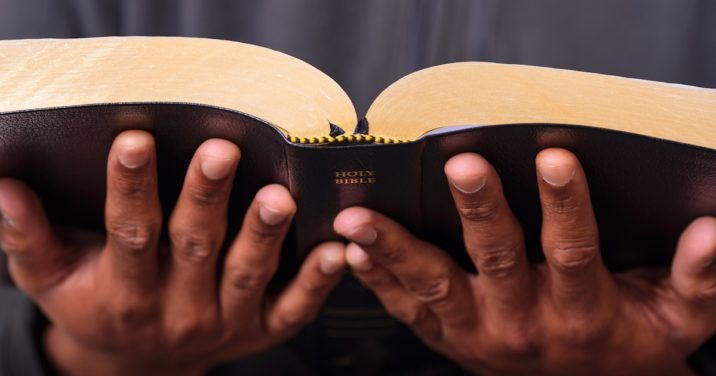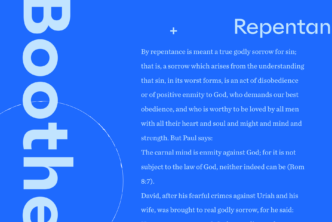February is Black History Month, and I took opportunity to pick up a Lexham Press title by the late African American theologian Charles Octavius Boothe: Plain Theology for Plain People.
Our American culture has changed since this book was first published in 1890. People don’t call each other “plain” anymore, so I want to make certain readers understand that Boothe’s title is loving and not disdaining. He writes in the preface, “This little book’s only mission is to help plain people in the study of the first principles of divine truth.”
In love for truth, Boothe placed “the doctrines of our holy religion … in order, according to some definite system.” And in love for people, he let simplicity prevail—“simplicity of arrangement and simplicity of language.”
There are people who live on a plain so far beneath the mental heights of these works as to be unable to reach up to them and enjoy their spiritual blessings. For these people there come to us calls for the preparation of special works—calls which, in the name of Christ, we must try to answer.
While today’s writing conventions leave Boothe sounding a bit more formal and elaborate than his title might suggest, his effort to make systematic theology accessible is still evident—in at least three ways:
1. Boothe quotes Scripture often and in paragraphs
He does this, I think, to get context in readers’ minds. He wants them to understand the flow of thought in a text before he begins drawing theological conclusions from it. And he wants to show, over and over, where his authority as a theologian lies. He’s modeling “Theological Interpretation of Scripture.”
I found it refreshing, actually, to run across paragraph-long quotations of Scripture in this Plain Theology for Plain People. I even factored up the Scripture-to-commentary ratio in his section on election, and I found that 60% of the words are straight from the Bible.
I wouldn’t say this is common in systematic theology books, and I’m not sure they’re wrong to avoid Boothe’s approach. I do believe, however, that he’s right to use it. The repeated and sometimes lengthy Bible quotations, which often get pride of place in a given section, show “plain” Christian readers what “sophisticated” ones are supposed to know: that theology should emerge from the Bible.
2. Boothe finds apt, concrete illustrations
Quick: illustrate divine aseity and independence for a “plain” person using concrete images familiar to them. That’s tough. Boothe does it by making contrasts with two objects that are not independent:
That power by which the clock points its hands to the passing hours is not in the clock; it came out of the brain and hand of its maker and of him that winds it up. That power with which the steam engine draws its forty or fifty cars comes not out of the engine, but out of the mind of the machinist and from the heat of the flame in its bowels. (12)
But not all of his illustrations are drawn from concrete experience. The Bible so clearly fills Boothe’s mind that its images seep out. There were likely few lepers in his audience, but when he uses leprosy as a metaphor for the effects of the fall, the image is striking—and accessible to anyone with even minimum Bible knowledge.
Bitter cup! Dark and doleful future! The soul is leprous! Woe to the world for the mournful sounds and woeful sights which it must now hear and see! (29)
3. Boothe provides lessons from a different context—and he doesn’t
Many men and women of all sorts of ethnicities who are not “plain people” read this blog, and it is fair for you to ask: Why should I read a book that, judging by the title, is not aimed at me?
Walter Strickland, an African-American himself and Assistant Professor of Systematic and Contextual Theology at Southeastern Baptist Theological Seminary, provides an answer to that question in his introduction to Boothe’s book:
Unity in Christ demands an openness to collaboration and to mutual sharpening in the theological task. Evangelicals often presume that the task of theology is merely to comprehend God. But the goal of theology is wisdom—a lived demonstration of knowing God. God, not context, has ultimate authority, and yet wisdom demands understanding the context in which Christians live and God works. (xi)
The question is: is there anything about our current context that we can learn from Boothe’s? The answer to that question is a double “yes,” and then a “no.”
Different context
- Yes, we can learn to work hard to put serious, meaty theology into the hands of people for whom it is normally not accessible. It is the work of a pastor to distinguish between “the soft bigotry of low expectations” and putting the cookies on too high a shelf. It is inspiring to watch an educated man like Boothe love his readers enough to teach them theology without patronizing them. Far from looking down on them, I found it poignant and wise that Boothe would begin his book by telling his “plain” readers not to think too highly of themselves!
Let us not be unmindful of the fact that we vile, short-sighted worms should approach the solemn task of studying God with feelings of humility and awe. God is found of the lowly, but hides himself from the proud and self-sufficient man. (4)
When I taught “plain” people for a good decade, I always wished to show them the respect of telling them the unvarnished truth from Scripture. I felt vindicated when I read Boothe doing the same in his context more than a century ago.
- Yes, we can learn how to faithfully use the Bible to address parts of our world with which we may have little contact, thereby opening up conduits for truth and grace to flow both ways. I can’t honestly say I’ve read numerous books by people outside my cultural home base. I can honestly say that when I have, it has been helpfully jarring. My brothers and sisters of other tribes, tongues, and nations (and centuries) just don’t bring the same cultural lenses I bring to the Bible or the world, even when we share precious beliefs in Jesus and in Scripture. I’m helped when I read the Bible through different cultural eyes.
Same Lord, same faith, same baptism
But is Boothe’s theology different because he saw the Bible through different eyes? No.
I expected Boothe—a man born as a slave 150 years ago and who never saw the Civil Rights Movement, a man who was writing to sharecroppers in the dawn of the Jim Crow era—to come at me from a noticeably different cultural perspective. But, honestly, the similarities between us were far, far greater than the differences. I went on a search for our differences—I wanted to be jarred—but I can’t really say any stood out.
In reading Boothe I recognized my own faith, my own theology; and I found this comforting. Yes, his context was different. Yes, he was formed by many experiences foreign to me. But he approached the Bible loving the same Lord and confessing the same doctrines—and he therefore saw in Scripture the same things I see.
I want to be careful not to ask Christians from the Global South or even the American inner-city to see theology in precisely the way I do; we celebrate Black History Month in part so people in the cultural majority can be reminded that we are wearing cultural lenses—something we are prone to do. But people “from all tribes and peoples and languages” will worship the Lamb (Rev 7:9); it is no surprise that cultural differences can be transcended by one Lord, one faith, one baptism (Eph 4:5). That, to me, was the overriding message of Boothe’s warm and careful and richly scriptural book, Plain Theology for Plain People.
***
Pick up the forgotten masterpiece Plain Theology for Plain People today, or learn more in these resources.
Related articles
- Theological Development among African American Slaves
- Black History Is Family History
- Frederick Douglass: Slaves Sing Most When they are Most Unhappy
Related resources
- Plain Theology for Plain People by Charles Octavius Booth
- History and Theology of the African American Church (Course)
- Glory Road: The Journeys of 10 African Americans into Reformed Christianity by Roger Skepple, et al.
- Kingdom Race Theology: God’s Answer to Our Racial Crisis by Tony Evans
- Reading While Black: African American Biblical Interpretation as an Exercise in Hope by Esau McCaulley
- Urban Apologetics: Resorting Black Digity with the Gospel by Eric Mason
- The Color of Compromise: The Truth about the American Church’s Complicity in Racism (Audio Lectures)





